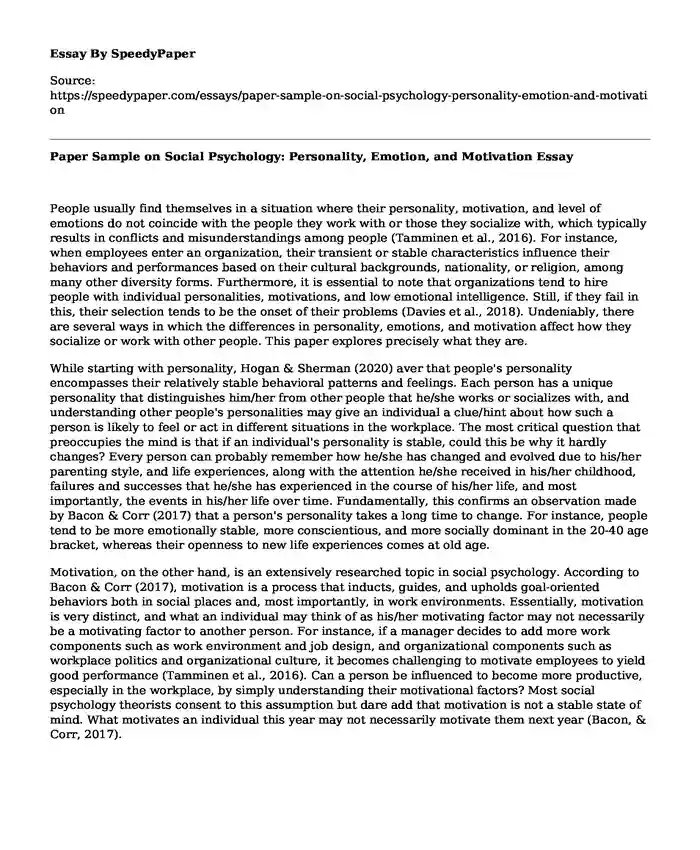
| Type of paper: | Essay |
| Categories: | Psychology Motivation Personality Emotional intelligence |
| Pages: | 3 |
| Wordcount: | 773 words |
People usually find themselves in a situation where their personality, motivation, and level of emotions do not coincide with the people they work with or those they socialize with, which typically results in conflicts and misunderstandings among people (Tamminen et al., 2016). For instance, when employees enter an organization, their transient or stable characteristics influence their behaviors and performances based on their cultural backgrounds, nationality, or religion, among many other diversity forms. Furthermore, it is essential to note that organizations tend to hire people with individual personalities, motivations, and low emotional intelligence. Still, if they fail in this, their selection tends to be the onset of their problems (Davies et al., 2018). Undeniably, there are several ways in which the differences in personality, emotions, and motivation affect how they socialize or work with other people. This paper explores precisely what they are.
While starting with personality, Hogan & Sherman (2020) aver that people's personality encompasses their relatively stable behavioral patterns and feelings. Each person has a unique personality that distinguishes him/her from other people that he/she works or socializes with, and understanding other people's personalities may give an individual a clue/hint about how such a person is likely to feel or act in different situations in the workplace. The most critical question that preoccupies the mind is that if an individual's personality is stable, could this be why it hardly changes? Every person can probably remember how he/she has changed and evolved due to his/her parenting style, and life experiences, along with the attention he/she received in his/her childhood, failures and successes that he/she has experienced in the course of his/her life, and most importantly, the events in his/her life over time. Fundamentally, this confirms an observation made by Bacon & Corr (2017) that a person's personality takes a long time to change. For instance, people tend to be more emotionally stable, more conscientious, and more socially dominant in the 20-40 age bracket, whereas their openness to new life experiences comes at old age.
Motivation, on the other hand, is an extensively researched topic in social psychology. According to Bacon & Corr (2017), motivation is a process that inducts, guides, and upholds goal-oriented behaviors both in social places and, most importantly, in work environments. Essentially, motivation is very distinct, and what an individual may think of as his/her motivating factor may not necessarily be a motivating factor to another person. For instance, if a manager decides to add more work components such as work environment and job design, and organizational components such as workplace politics and organizational culture, it becomes challenging to motivate employees to yield good performance (Tamminen et al., 2016). Can a person be influenced to become more productive, especially in the workplace, by simply understanding their motivational factors? Most social psychology theorists consent to this assumption but dare add that motivation is not a stable state of mind. What motivates an individual this year may not necessarily motivate them next year (Bacon, & Corr, 2017).
Conclusion
Finally, emotions also affect the way people interact, socialize, and work together. Essentially, emotions shape people's beliefs about the value of their organization, job, and team (Tamminen et al., 2016). To some extent, emotions influence people's behaviors at the workplace due to several factors, such as cultural diversity. One may be puzzled to know what connects people's emotions, behaviors at work, and attitudes. For a better understanding of this connectivity, Affective Events Theory (AET) comes into play. According to AET, certain events at a workplace may make people develop different emotions, which may, in turn, inspire actions that can either impede or benefit others at work (Wegge et al., 2006). Human beings are naturally emotional, and each day, different emotions are experienced both in society and workplaces.
References
Bacon, A. M., & Corr, P. J. (2017). Motivating emotional intelligence: A reinforcement sensitivity theory (RST) perspective. Motivation and Emotion, 41(2), 254-264. Retrieved from: https://openaccess.city.ac.uk/id/eprint/16256/3/
Davies, G., Rojas-Méndez, J. I., Whelan, S., Mete, M., & Loo, T. (2018). Brand personality: theory and dimensionality. Journal of Product & Brand Management. Retrieved from: http://centaur.reading.ac.uk/88534/1/Brand%20personality_JPBM_prefinal_.pdf
Hogan, R., & Sherman, R. A. (2020). Personality theory and the nature of human nature. Personality and Individual Differences, 152, 109561. Retrieved from: https://sites.google.com/a/infelligent.com/default/hogan-assessments/hogan_video/xinggelilunyurenxingdebenzhi/Personality%20and%20Individual%20Differences.pdf
Tamminen, K. A., Gaudreau, P., McEwen, C. E., & Crocker, P. R. (2016). Interpersonal emotion regulation among adolescent athletes: A Bayesian multilevel model predicting sport enjoyment and commitment. Journal of Sport and Exercise Psychology, 38(6), 541-555. Retrieved from: https://osf.io/2tcbg/download
Wegge, J., Dick, R. V., Fisher, G. K., West, M. A., & Dawson, J. F. (2006). A test of basic assumptions of Affective Events Theory (AET) in call center works 1. British Journal of Management, 17(3), 237-254. Retrieved from: https://www.academia.edu/download/45038558/A_Test_of_Basic_Assumptions_of_Affective20160424-5036-1y7nt0n.pdf
Cite this page
Paper Sample on Social Psychology: Personality, Emotion, and Motivation. (2024, Jan 28). Retrieved from https://speedypaper.net/essays/paper-sample-on-social-psychology-personality-emotion-and-motivation
Request Removal
If you are the original author of this essay and no longer wish to have it published on the SpeedyPaper website, please click below to request its removal:
- Police Brutality Paper Sample: The Case of Walter Scott
- Essay Example: Personal Marketing Plan
- Hybridity in the Book Ceremony, Free Essay Sample
- Essay Sample on Critical Reading and Critical Thinking
- Free Essay - Mind in Society by L. S. Vygotsky
- Paper Example. Political-administration Dichotomy
- Challenges of Interprofessional Communication in Terrorism- Essay Sample
Popular categories




